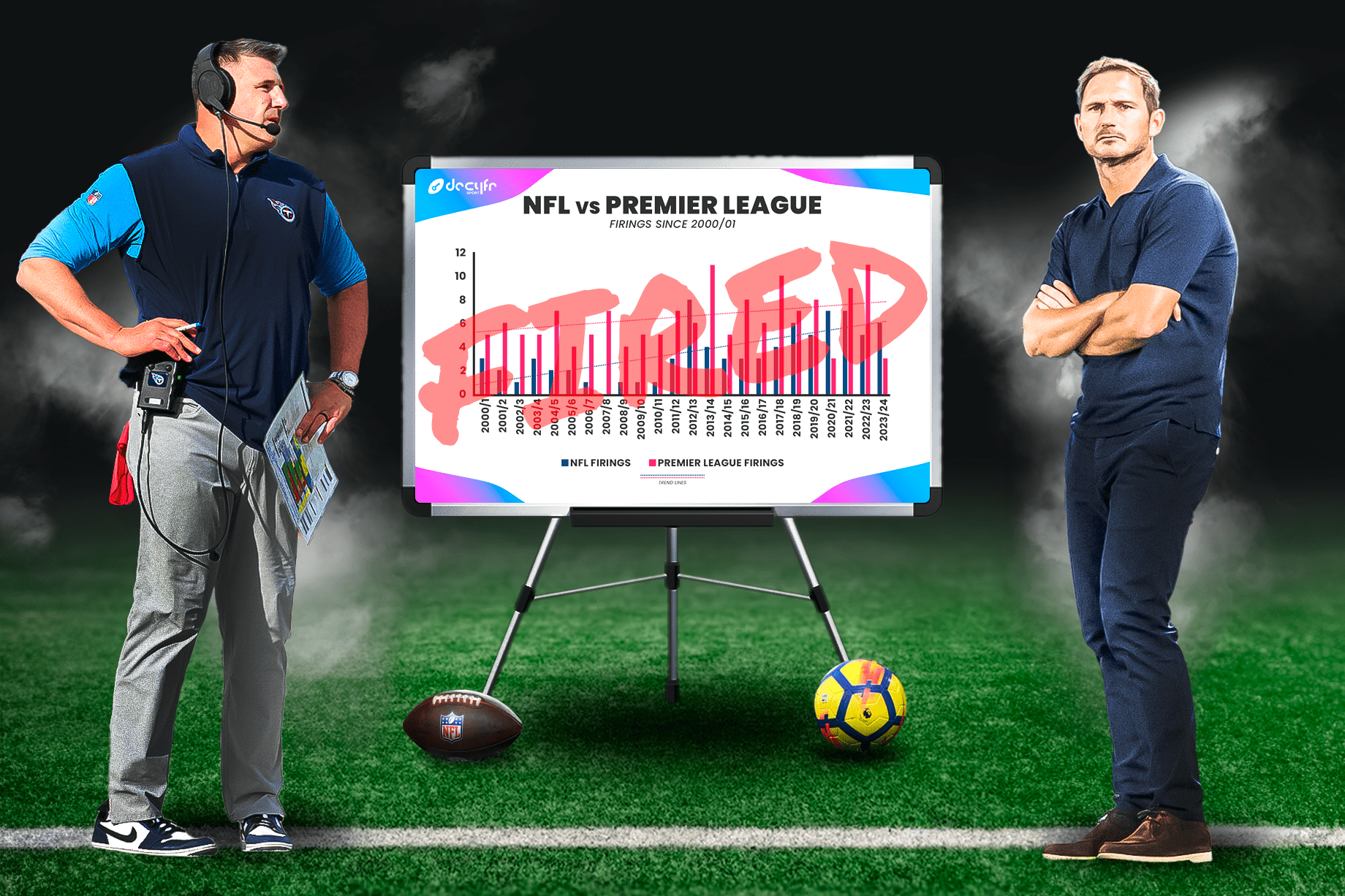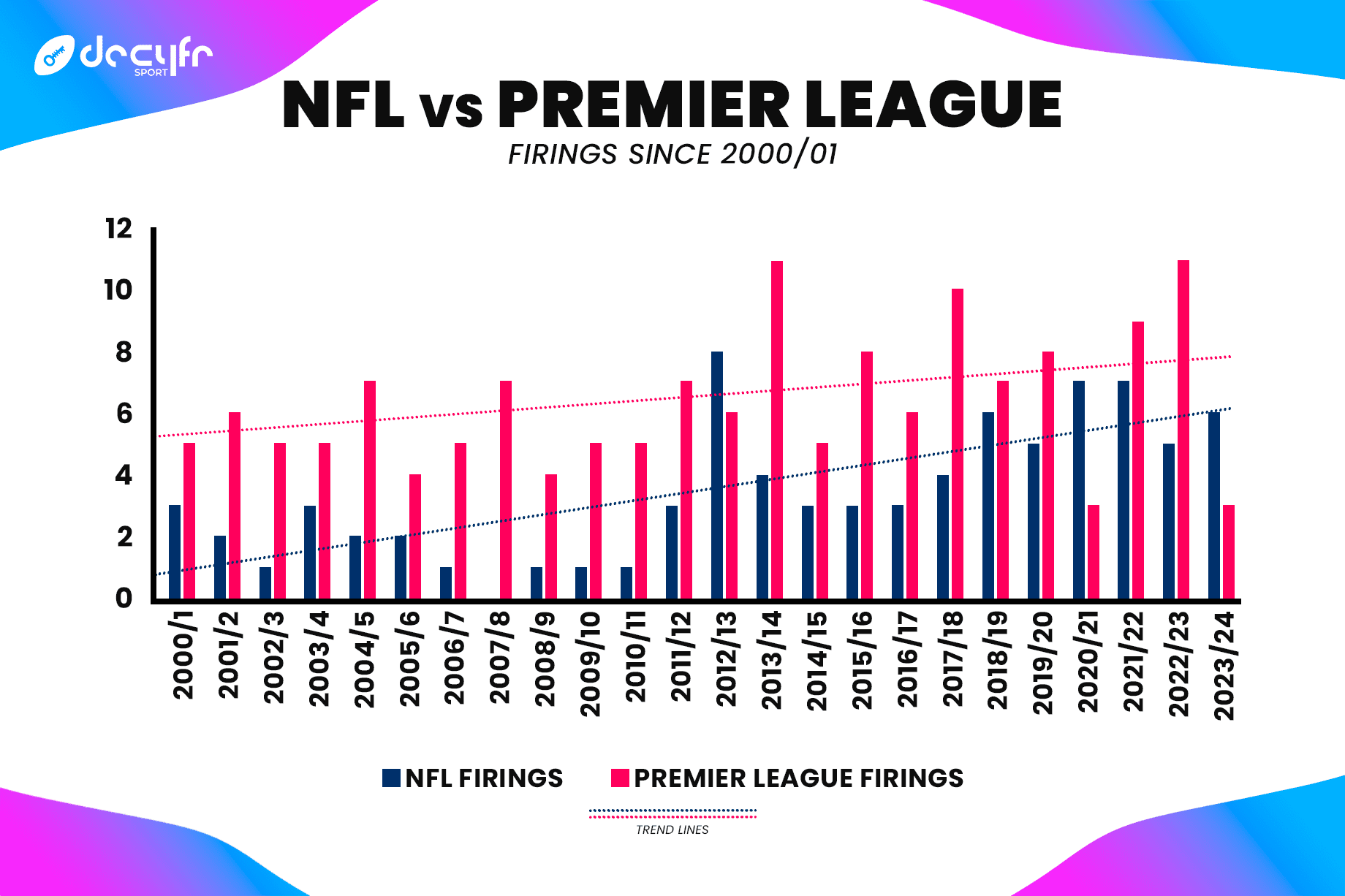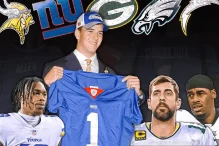

‘Black Monday’ is an annual occurrence infamous around the NFL for seeing more firings than any other day on the calendar, and this year was no different – with the dreaded occasion contributing to eight head coaches losing their jobs or moving on in 2024. With nearly two weeks now separating us from the majority of those firings, Decyfr takes a deep dive into the trends that have been prevalent in the 21st century – comparing the rate of dismissals for head coaches in the NFL to that of managers in the Premier League.
With 12 more teams in the NFL than in the Premier League – and increasingly demanding ownership – the assumption would be that the NFL would clock a significantly greater number of annual firings. However, since the turn of the century, the Premier League has seen a staggering 152 managerial sackings while the NFL has experienced just 81 – that’s an additional 71 firings this side of the pond – higher by a remarkable 46.7%.
This increased rate is also reflected in the average tenure of a Premier League manager compared to that of an NFL head coach. According to a BBC study from 2022, the average tenure for a top-flight manager stood at 2 years and 4 days, but back in 2012, managers lasted for nearly 4 years. Meanwhile, a 2016 report from Business Insider, showed that the average tenure of an NFL coach at the time was 4.3 years.
That said, the NFL has seen a much greater increase in the number of annual firings than the Premier League – jumping from an average of 1.7 firings per year, from 2000 to 2012, to an average of 5.1 since 2012 – compared to the Premier League – which increased by only 1.9 per year during the same period.
Financial metrics such as franchise valuation, sponsorship revenue and ticket sales could arguably be key reasons for the increased turnover of head coaches and managers – in a highly result-oriented industry. In the NFL, for example, Statista state that the average value of a franchise increased from $423 million in 2000 to $5.11 billion in 2024. With so much more at stake financially, it’s no surprise that ownership is more impatient now than ever before.
Chelsea and the Las Vegas Raiders are prime examples of this. Since the year 2000, they have fired 18 and 13 managers (or head coaches) respectively – that’s more than any other team in either league. Particularly interesting given that both teams rank in the top 10 most valuable teams in 2023, for their respective leagues, and (according to Forbes and Statista) have seen a constant increase in valuation from the early 2000s – Chelsea rising from $233 million in 2003 to $3.1 billion in 2023 and the Raiders jumping to $6.2 billion from just $421 million. That said, the similarities between these two franchises end there – as Chelsea’s high-turnover approach to management has seen them win four Premier League and two Champions League titles, whilst the Raiders have won a solitary AFC Championship (in 2002) and are still seeking their first Super Bowl win since 1984.
Another major contributing factor to the increased level of impatience in the NFL could be the development of young quarterbacks. With the heightened number of QB camps and tournaments on offer in the U.S., quarterbacks are coming into the NFL more ‘pro-ready’ than they did previously. In fact, winning a Super Bowl with a quarterback that is still on a rookie deal is now looked at as one of the most successful formulas. Whereas, in the early 2000s, most teams accepted that quarterbacks would take two-to-three years to fully develop. This potentially explains the notable jump in NFL firings between 2010/11 and 2012/13 – with more owners recognising this shift in the success of young QBs and subsequently placing more pressure on head coaches.
With teams like Newcastle United and the Houston Texans seeing an immediate improvement following a change at the top in recent years, fanbases and ownership alike are becoming increasingly desperate for overnight success – likely resulting in even shorter tenures for those in charge going forward.
https://decyfrsport.com/sackathon-nfl-vs-premier-league-who-is-more-prolific-at-firing-coaches/
Copied!





















































































































